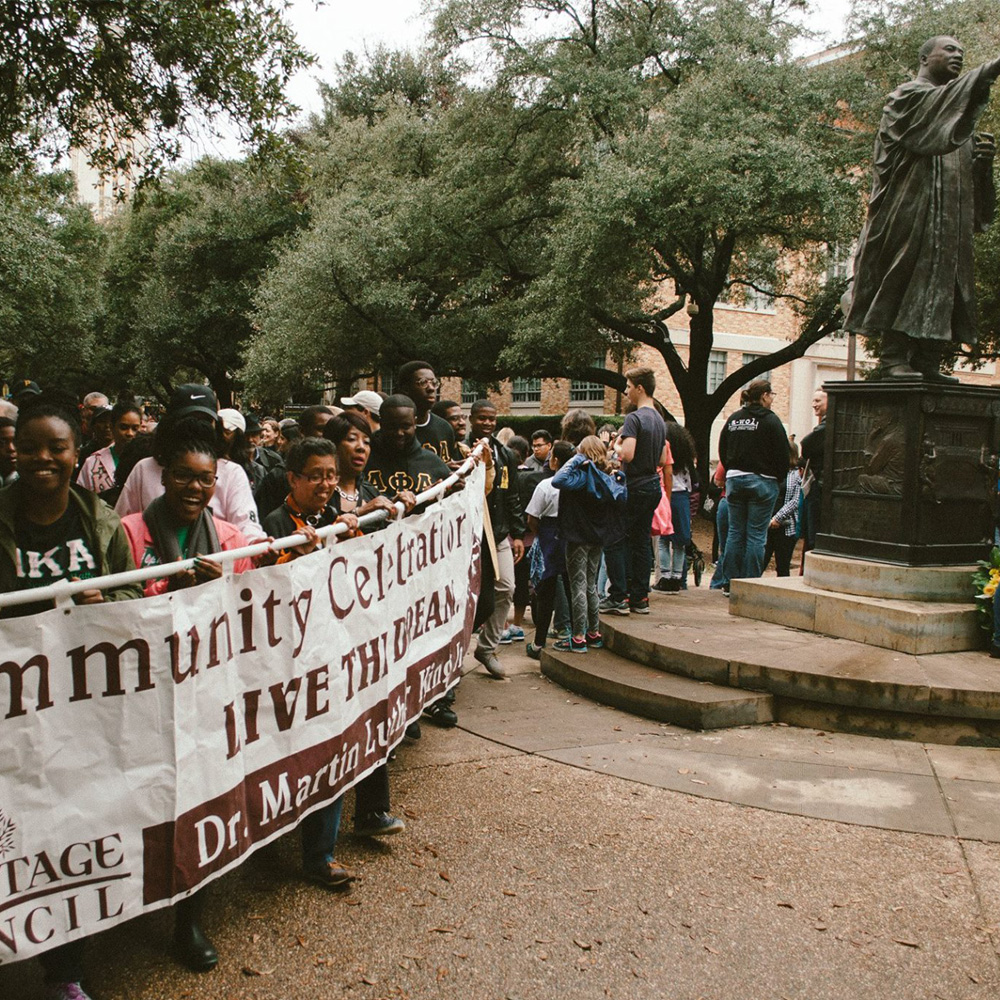
CP&I Newsletter #AISDEquity
Cultural Proficiency & Inclusiveness ~ January 2020
The goal of the Office of Cultural Proficiency & Inclusiveness is to provide ongoing, meaningful professional learning opportunities for AISD staff to engage in critical self-reflection on their interaction with students and their families in a manner that considers the diverse needs of all.
MESSAGE FROM DR. WARD, AUSTIN ISD RACE EQUITY ADMINISTRATIVE SUPERVISOR
Cultural Proficiency is the heart of Social Emotional Learning (SEL). Without a clear understanding of your personal historical narrative (background, biases, values, beliefs) you operate in the system of education as an unaware adult. Personal awareness when coupled with critical self reflection provides each of us with an internal compass to guide the interruption of our biases as we create identity-safe school spaces and workplaces. Culturally Responsive Restorative Practices (CRRP) are a component of Austin ISD Cultural Proficiency that enables Austin ISD to nurture identity-safe spaces. Take a look at my SEL Vlog to hear how we approach both and the connections to SEL.
How do I register to attend CP&I Professional Learning?
Austin ISD Staff
1) Search the session number in the HCP, or
2) To view all CP&I sessions in the HCP, search "cultural proficiency" and click "view all sections" under each of the three CP&I courses.
Community Members
We welcome community members to our professional learning sessions. If you are a community member interested in attending any of the CP&I sessions, please email cultural.proficiency@austinisd.org to receive an the EventBrite registration link.
No partial credit available. Please check the session times and plan accordingly.
CP&I PROFESSIONAL LEARNING
Cultural Proficiency: The 6th C
April 8th session #93133
Isolating Race
January 16th session #93557
January 22nd session #93121
January 30th session #93122
February 18th session #93123
Becoming an Antiracist Educator: Words Have Power
February 11th session #93124
* Completion of Isolating Race required to register.
It’s Not Discipline: Culturally Responsive Restorative Practices 101
February 13th session #93125
* Completion of Isolating Race required to register.
White Fragility:
Understanding Whiteness to Overcome Discomfort in Conversations About Race
February 20th session #93449
March 4th session #93127
* Completion of Isolating Race required to register.
Institutional Racism in an Austin, TX Context
February 25th session #93128
* Completion of Isolating Race required to register.
Connecting with Families: Exploring & Planning to Interrupt Implicit Bias & Stereotype Threat
February 27 session #93126
* Completion of Isolating Race required to register.
Equity and Belonging
March 31st session #93129
* Completion of Isolating Race required to register.
Mindfulness and Unconscious Bias
April 2nd session #93130
* Completion of Isolating Race required to register.
Teaching About King’s Radical Approach to Social Justice
"In classrooms every year around this time—and again during Black History Month—Dr. Martin Luther King Jr. is celebrated for his fight for civil rights. While there are numerous opportunities to learn about King’s social justice campaigns beyond the “I Have a Dream” speech, some educators still get stuck with a sanitized narrative of his activism.
In addition to his pleas for love and equality, King also called out discriminatory policies in an effort to bring forth economic justice, spoke out against war and supported Nelson Mandela’s fight to end apartheid in South Africa. As we honor his nonviolent fight against injustice in the United States, we cannot erase his commitment to upend systemic racism and white supremacy everywhere."
To learn more, read the full article and watch videos of Dr. King in the Teaching Tolerance video below...
Austin's MLK March, Festival, and Food Drive on Jan. 20th
Five Ways to Avoid Whitewashing the Civil Rights Movement
From Teaching Tolerance:
1. Educate for empowerment.
2. Know how to talk about race.
3. Capture the unseen.
4. Resist telling a simple story.
5. Connect to the present.
Black history is [American history and] much more than the civil rights era. It is critical that students have a truthful—and complete—understanding of this foundational movement.
Full article: https://www.tolerance.org/magazine/five-ways-to-avoid-whitewashing-the-civil-rights-movement
Indigenous Peoples' History of the United States
Here is a link to a teacher's guide: http://www.beacon.org/assets/clientpages/IndigenousHistoryYAtg.aspx
CULTURALLY RESPONSIVE RESTORATIVE PRACTICES
Austin ISD's Culturally Responsive Restorative Practices (CRRP) model intentionally honors and acknowledges the indigenous roots of restorative practices to create campus environments where students, parents, and staff nurture trusting relationships, are invited to share and be their authentic selves, and have a sense of belonging and connection in the campus community.
The Core Assumptions are a collection of principles that can be found in indigenous wisdom and cultural traditions from around the world. As CRRP practitioners we identify and critically reflect on our beliefs and values to better understand those different from us. We offer the quote below as reflection on why it is important to identify and reflect on our beliefs and values.
"Your beliefs become your thoughts, your thoughts become your words, your words become your actions, your actions become your habits, your habits become your values, your values become your destiny." - Ghandi
The Seven Core Assumptions:
What we believe
1. The true self in everyone is good, wise & powerful
2. The world is profoundly interconnected
3. All human beings have a deep desire to be in a good relationship
4. All humans have gifts, & everyone is needed for what they bring
5. Everything we need to make positive change is already here
6. Human beings are holistic
7. We need practices to build habits of living from the core self
**Source: Circle Forward by Carolyn Boyes-Watson & Kay Pranis (2015) Living Justice Press**
For personal reflection: Which Core Assumption resonates with you most and why? Which Core Assumption challenges you and why? What are some of your personal core beliefs? How do your beliefs impact your actions as an educator?
If you're interested in learning more about the CRRP in Austin ISD, attend Isolating Race, then sign up in the HCP for:
It’s Not Discipline: Culturally Responsive Restorative Practices 101
February 13th session #93125
Culturally Responsive Restorative Practices (CRRP) model is a culturally proficient, child centered, developmentally appropriate, social, emotional, academic and trauma informed process founded on indigenous roots of harmony and community connection. Participants experience academic and social, emotional processes, and protocols on a continuum of affective language, affective questions, and intentional conversations to develop campus wide Tier 1 implementation of CRRP. * Completion of Isolating Race required to register.
LATINX SUMMIT FOR COURAGEOUS CONVERSATIONS
Amazing Professional Learning Opportunity!
The 2020 Latinx Summit for Courageous Conversation
will be held April 15-18, 2020
at the Hyatt Regency Downtown in Houston, Texas.
The Latinx Summit for Courageous Conversation is our annual convening of Latinx people to build capacity for racial equity leadership in the United States and beyond. Uniquely different from our annual National Summit for Courageous Conversation (NSCC), the Latinx Summit for Courageous Conversation (LSCC) is specifically designed and developed to meet the unique and pressing racial equity needs of Latinx people. To this end, PEG staff, speakers and participants may freely engage in the languages spoken by Latinx communities while discussing relevant issues that draw on community-based experiences unique to members of the Latinx diaspora. While recognizing the importance of creating affinity space for cultivating emerging Latinx racial equity leadership, all are welcome to join this rich and rare gathering.
Learn more and register at: https://summit.courageousconversation.com/latinx-summit/
WHAT WE'RE READING
Teaching Tolerance Magazine
"An increase in suicide rates among black children ages 5 to 12 points to a crisis, and the mental health of black youth is too often ignored. But educators are in key positions to make a difference. TT Staff Writer Coshandra Dillard explains how in this issue’s cover story, “Black Minds Matter.”
Subscribe today, and never miss a story."
Where Do We Go From Here: Chaos or Community?
Heart of Hope
Belonging Through a Culture of Dignity
Past CP&I Newsletters
December 2019 https://www.smore.com/5f2t9
November 2019 https://www.smore.com/n0x65
October 2019 https://www.smore.com/7te4p
September 2019 https://www.smore.com/7z9hk
Follow us on Twitter and mention #AISDEquity when sharing about
your learning and engagements in #AISDEquity work.
























